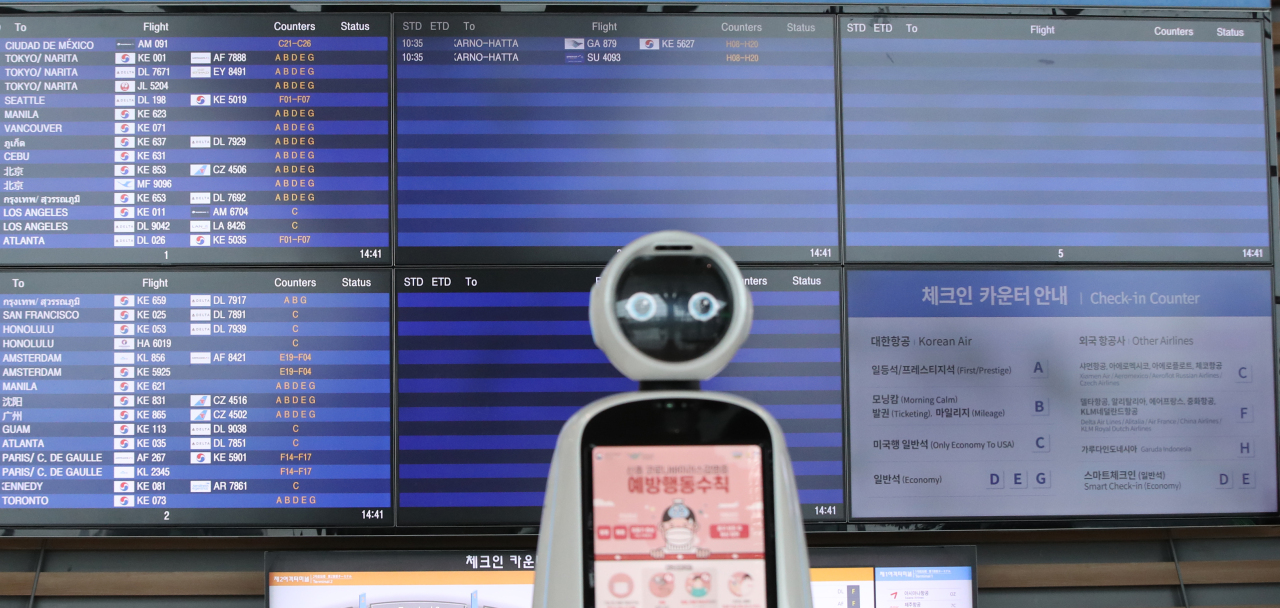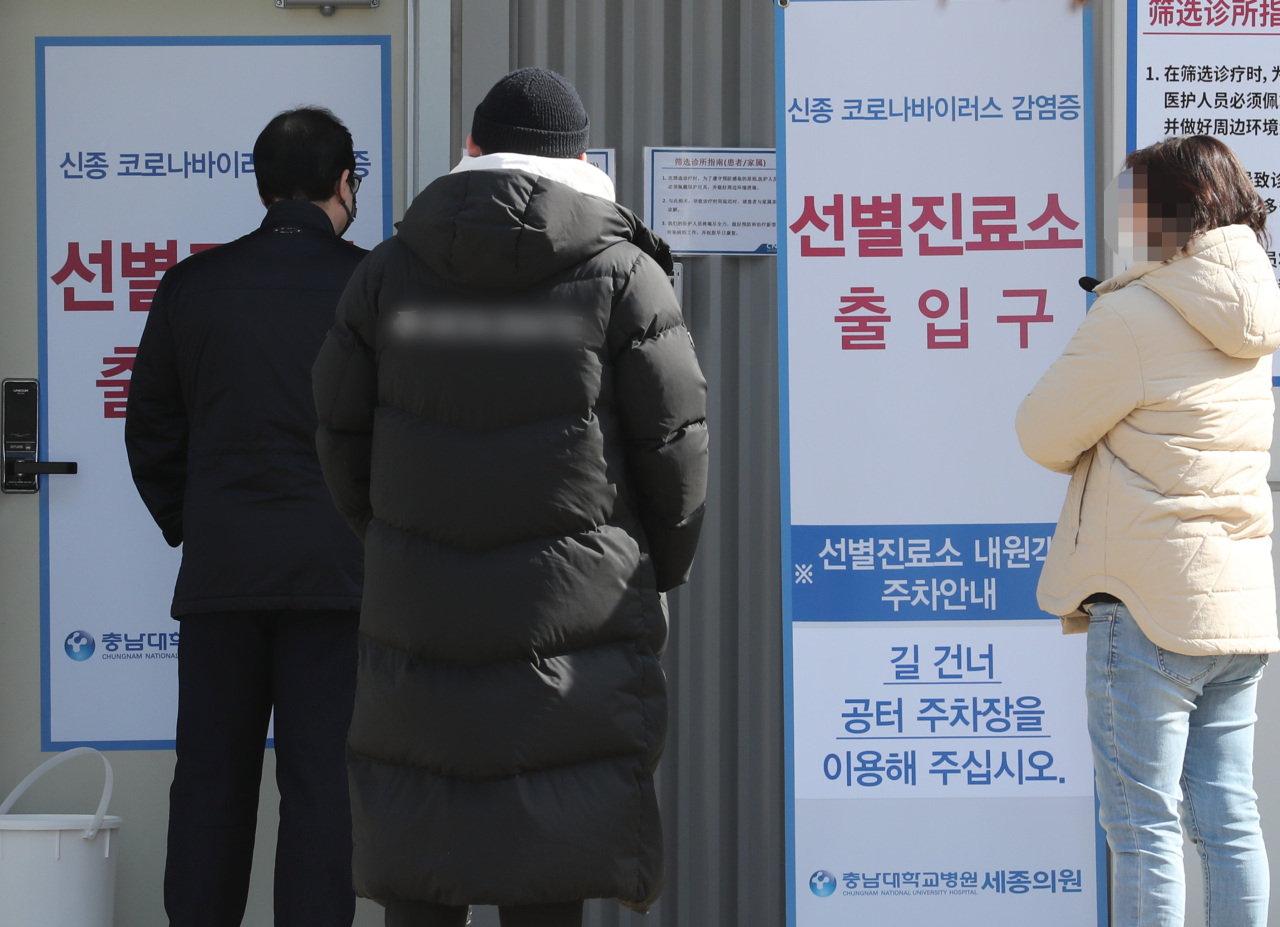 |
(Yonhap) |
South Korea said Thursday that those arriving in the country after visiting five European countries, including Germany, will face stepped-up quarantine requirements starting next week, as the government grapples with the largest-yet cluster infections of novel coronavirus in the capital.
South Korea’s coronavirus cases climbed by 114 to 7,869 as of midnight Wednesday, the lowest daily increase in nearly three weeks, according to data from the Korea Centers for Disease Control and Prevention. The death toll rose by seven to 67.
Health authorities said they will continue to employ two-way approaches -- blocking community spread and controlling the inflow of COVID-19 from abroad -- as the World Health Organization has declared the coronavirus a pandemic.
The number of coronavirus cases linked to a call center in southwestern Seoul has reached 102, Seoul Mayor Park Won-soon said at a briefing Thursday, leading the municipality to designate the affected building and nearby areas as a “special support zone for contagious diseases.”
Of the cases, 71 resided in Seoul, 17 in Incheon and 14 in Gyeonggi Province, sparking fears about community spread of the virus in the capital and surrounding cities, which is home to 26 million people, about half of the country’s population.
“We will respond to and overcome COVID-19 through citizens’ voluntary efforts and proactive administrative measures while maintaining the city’s function,” Park said, signaling he is not considering placing Seoul under lockdown like the Italian government did.
The majority of the patients are among the 207 people who were working at the call center on the 11th floor of a 19-story building in Guro-gu, southeastern Seoul. The tests and an epidemiological study on some 553 employees on other floors is underway.
Two employees on the 9th and 10th floor were confirmed to be infected with the virus Thursday, highlighting concerns about the spread to residents in the 19-floor building located nearby one of the capital’s transport hubs, Sindorim Subway Station.
Guidelines for businesses with packed environments -- such as call centers, religious facilities, education institutes, fitness centers and nightclubs -- were distributed by health authorities on Thursday to prevent further mass coronavirus infection.
 |
(Yonhap) |
Starting Sunday, those who enter Korea from five European countries -- France, Germany, Spain, the United Kingdom and Netherlands -- will be required to get fever checks and have their contacts confirmed before entering the country. Upon entry, they will be required to download a smartphone app and inform authorities of their health condition over a 14-day period.
The requirements will also be applied to all people who arrive in the country via Dubai, Moscow and other cities after traveling to Europe in the previous two weeks.
Such requirements have been applied to people who have visited mainland China, Macao, Hong Kong, Iran and Italy.
The move comes after a 28-year-old man tested positive for the virus upon his return to Korea on Sunday after visiting London and Paris between Feb. 27 and Saturday. The case follows another 24-year-old man infected with the virus after traveling across Europe between Feb. 18 and March 3.
Korea, which had reported daily increases of 500 or more cases for the past two weeks, has seen a slowing trend this week, especially in Daegu and North Gyeongsang Province, as the government has nearly finished testing followers of the Shincheonji Church of Jesus for the virus. The fringe religious sect that is linked to nearly 60 percent of the country’s total cases.
Government officials, however, have warned against attaching significance to the daily infection figures.
Of the 114 new cases across the country confirmed Thursday, 19 new cases were reported in Seoul and three in Gyeonggi Province, with most of those linked to the call center in southwestern Seoul, according to the KCDC data.
Sejong, where the Government Complex is located, reported five more cases, according to the data. A total of 16 government officials at the complex, which accommodates 35 ministries and agencies, confirmed to be infected with the virus as of Thursday afternoon.
There were 73 new cases in the southeastern city of Daegu, which has been at the heart of the country’s virus outbreak, along with eight in North Gyeongsang Province, according to the data. The number of cases in the region represents about 90 percent of the country’s total.
Some 80 percent of the country’s total cases have been linked to infection clusters, nearly 70 percent of which can be traced to the Daegu branch of the Shincheonji church, according to the KCDC.
The Daegu Metropolitan Government conducted an administrative inspection of the office of the Shincheonji church’s Deagu branch to secure documents and materials necessary for containment measures.
As of Thursday afternoon, 67 people, mostly those in their 60s or older and with underlying illnesses, had died from COVID-19 here, with the overall fatality rate at 0.85 percent. According to KCDC numbers, the death rate here stood at 4.83 percent for those in their 70s and 8.23 percent for those in their 80s.
Some 93 people were serious or in critical condition, according to the KCDC.
A total of 7,470 people who were confirmed to have been infected remained in quarantine, while 333 people had been released upon making full recoveries.
The number of people awaiting test results for the virus stood at 17,727. The country has so far tested 227,129 people, with 209,402 testing negative as of Wednesday midnight.
The WHO has declared the worldwide outbreak of the new coronavirus a pandemic, with more than 126,000 cases reported in over 110 countries and 4,600 deaths.
By Ock Hyun-ju (
laeticia.ock@heraldcorp.com)








![[Today’s K-pop] Blackpink’s Jennie, Lisa invited to Coachella as solo acts](http://res.heraldm.com/phpwas/restmb_idxmake.php?idx=644&simg=/content/image/2024/11/21/20241121050099_0.jpg)
